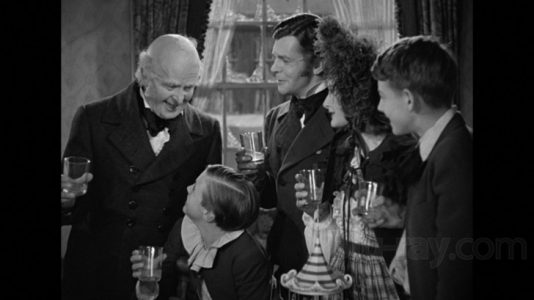“Mankind was my business. The common welfare was my business; charity, mercy, forbearance, benevolence, were all my business. The dealings of my trade were but a drop of water in the comprehensive ocean of my business!” The ghost of Jacob Marley, speaking to Ebenezer Scrooge ― Charles Dickens, A Christmas Carol

Scene from the 1938 Warner Brothers film “A Christmas Carol.”
The moral lessons in A Christmas Carol are told in the context of this Christian holiday, yet their relevance and power transcend a specific faith tradition. They are universal, resonating with people of all faiths and cultures.
They cause us to reflect on what matters, and examine our own lives in their light. Each year at this time I watch the 1938 film adaptation of A Christmas Carol (my favorite!), and it reminds me that kindness, gentleness, compassion, consideration, generosity, humanity, appreciating each other, and helping those in need, should always show up in our interactions with others and in the world around us. And each year I find myself lacking in always making “mankind…my business.”
When we think about it we all recognize the worth of living this way and experiencing these things. I expect we share the recognition that we don’t contribute to them enough even though the need is great.
When Dickens wrote A Christmas Carol in 1843, he was writing from his own experience and commenting on the conditions of his time. His words are just as relevant today, and speak to challenges that now exist on a global scale. Around the world and here in the United States polarization, distrust of others, prejudice, resentment, xenophobia, rage, animosity, and so on have grown to frightening proportions.
It seems we have lost our ability to work across differences within the context of a safe, civil society. The fabric of our democratic processes has been torn to the point where some wonder if it can be restored. This is very dangerous. Our way of life is at stake. I wrote in September about the desperate need for citizens to cultivate and use the skills of citizenship to create common ground and take back governance for ourselves to restore a functioning democracy.
Making “the common welfare…[our] business; charity, mercy, forbearance, benevolence” our business, we apply a healing salve to our interactions that gives relief to our neighbors and restores the shredded fabric of our national and international community. It’s the “spirit of the season,” and as Scrooge eventually realized, it is a way to live “throughout the year.”
So as we think about the coming holidays and all the hubbub they bring, as we think about the gifts we want to give, let’s agree to think about and give the greatest gift of all, in every interaction: the gift of love, of compassion, of kindness, of brotherhood and sisterhood. Let’s remember that “the common welfare” is our business.
In my view, nothing is more needed, and nothing can bring more joy, peace, or wellbeing to the giver and the receiver of these gifts, or do more to restore conditions that enable us to work across differences to create the world we want.





Mike,
Wonderfully stated. You are giving Thomas Friedman a run for his money.
Thank you for taking the time to craft such a thoughtful message.
Bob
Why are there no College of Agriculture students serving as interns for the Office of Sustainability?
Brandon —
Thank you for the inquiry.
3 of the 7 current interns in our office study within the College of Agriculture: 2 from Biosystems Engineering and 1 in Environmental Studies. We have also had students in prior academic years who came from the College of Agriculture.
Well Wishes,
Amy
Those are not agriculture majors even though from an organizational perspective they may be defined to be seen as such. How many of those grads will go on to a career in agricultural research, teaching, extension, production, and policy? My guess is zero.
Agromony, Animal Sciences, Agricultural Economics, etc….those are agriculture majors. It seems like such an underrepresented group and I would like help begin the process of having more of agriculture represented.
I am an Auburn Alum (AEC’93) and am very concerned about this issue. We have the most to lose from misguided definitions of sustainability, and the most to gain from the proper usage of the term.
Brandon, the makeup of our interns any given year depends on who applies, so the applicant pool is determined by students self-motivated and interested enough to apply. Another factor is the needs and priorities of our office for the next academic year. We broadcast invitations to apply across campus and invite all majors. As was previously stated, we have had several College of Ag majors as interns in past years.
Brandon —
As Mike mentioned our internship applicants self-select to apply.
This year we will be opening up applications mid-February and accept them through March 10th. We’ll be sharing the announcement on our website and social media, along with sending it through the standard university communication channels. If you know of a particular student that may be interested in applying or someone within the College of Agriculture that may be able to help spread the word, please don’t hesitate to share. We would be happy to work with you to help boost the number of applications received from the College, including from the more traditional agricultural majors. Please feel free to email us at sustain@auburn.edu or to give us a ring 334-844-7777 if you would prefer.
Amy